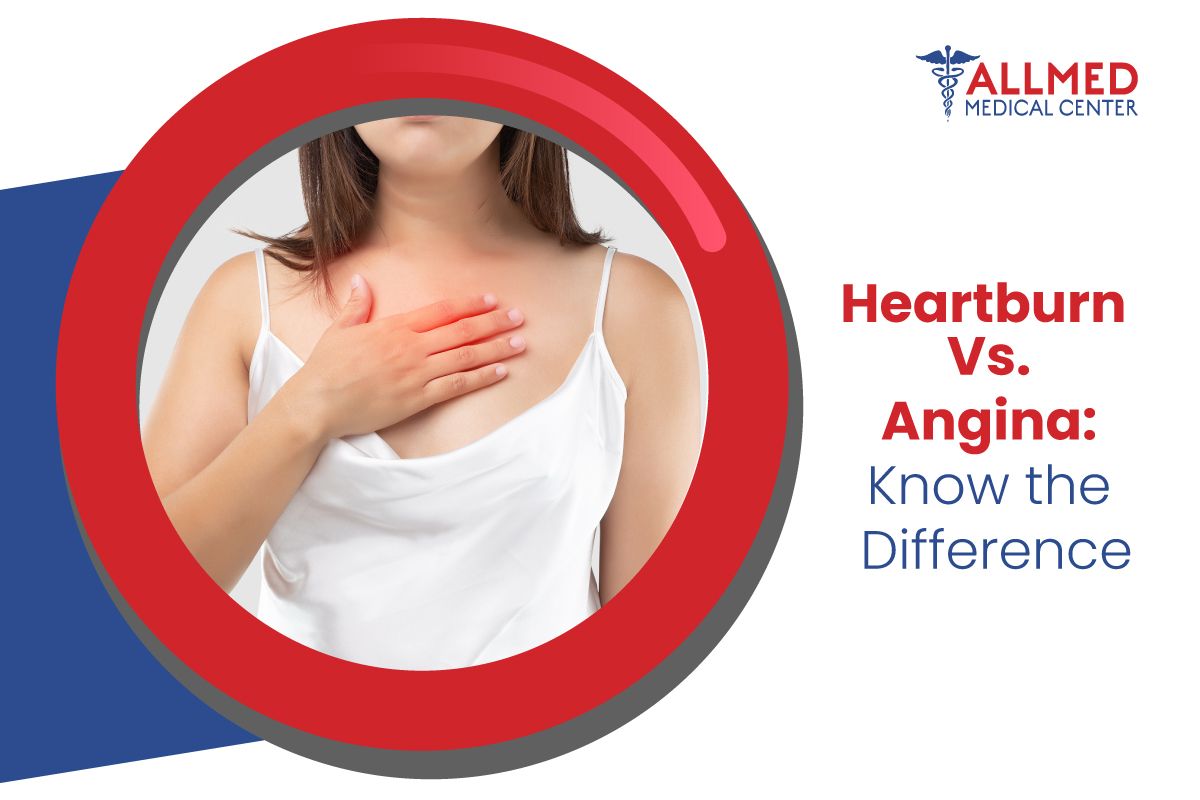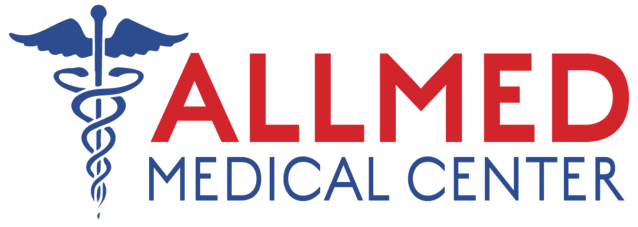
We Proudly Accept Medi-Cal and Medicare
Write your caption hereButton
Now Accepting Walk-ins!
Write your caption here

We Proudly Accept Medi-Cal and Medicare
Write your caption hereButton
Now Accepting Walk-ins!
Write your caption here

When you go to the doctor because you are experiencing chest pain, you have no idea what you are suffering. It can be a case of Heartburn or Angina. This article explains how to distinguish the two and determine which one you are experiencing.
What is Heartburn?
The condition of Heartburn is a symptom, not a disease. Heartburn is a sign of acid reflux, where stomach acid flows back into your esophagus.
So, can Heartburn cause chest pains? Acid reflux is often a result of stomach acids rising into the esophagus. This can give you chest pain that extends to the neck, throat, or jaw.
Several variables, including specific foods, drinks, medications, obesity, pregnancy, and hiatal hernia, can induce Heartburn. Sometimes it's a sign of a more serious problem, like gastroesophageal reflux disease (GERD). You should talk to a doctor if you have frequent or severe Heartburn.
What is Angina?
Angina, also called angina pectoris, is an illness that causes pain or discomfort. It is characterized by chest pain (pressure and squeezing in the chest area). It happens whenever your heart muscle does not receive sufficient oxygen-rich blood. Think of it like this, angina is the symptom of a heart attack, whereas a heart attack is the actual medical condition name.
This results from the
narrowing of the blood vessels, not a blockage of the coronary arteries, which happens during a heart attack.
There are
two kinds of Angina:
- Stable Angina usually happens when you work out or are stressed. Getting enough rest or medicine can help you feel better.
- Unstable Angina can happen when lying down and is a medical emergency since it can be a warning of an impending heart attack.
What is the difference between Angina and Heartburn?
Angina and Heartburn produce chest pain but have different causes.
What causes Angina?
One difference between heart attack and gastric pain causes is that the reduced blood supply to the heart muscle causes Angina.
Atherosclerosis can constrict or obstruct the heart's coronary arteries, causing plaque buildup in the arteries. Also, physical exercise, stress, or exposure to
frigid temperatures can cause Angina.
The following are other causes of Angina:
- Atherosclerosis, also known as the accumulation of fats, cholesterol, and other compounds in and on the walls of arteries
- Physical exercise
- Stress
- Exposure to frigid temperatures
What causes Heartburn?
Meantime, Heartburn occurs when acid from your stomach flows back up into your esophagus, which is a tube that runs through your chest, close to your heart.
Further, Heartburn causes a burning, painful feeling behind the breastbone, a sour taste in the mouth, trouble swallowing, and regurgitation of food or liquid.
The
following can cause Heartburn
- Smoking
- Pregnancy
- Stress and anxiety
- Food and drink like coffee, tomatoes, alcohol, chocolate, and fatty or spicy foods
- Overweight
- Medicines like anti-inflammatory painkillers like Ibuprofen
- Increase in some types of hormones, such as progesterone and estrogen
- When a part of your stomach moves up into your chest (Hiatus Hernia)
What are the different symptoms between Angina and Heartburn?
Suppose you want to know if you manifest symptoms of Heartburn or heart attack. Understanding that Heartburn and Angina could have similar symptoms would be beneficial. But their underlying causes are dissimilar.
Angina is a discomfort or chest pain due to a lack of oxygen and blood flow to the heart muscle. On the other hand, acid reflux causes Heartburn. We will enumerate each of the symptoms of Angina and Heartburn:
What are the symptoms of Angina:
- You feel pressure, tightness, squeezing, or the sensation of a heavy weight on your chest.
- Discomfort is most commonly felt in the center of the chest, although it can also be felt in the neck, jaw, shoulders, back, or arms.
- The pain usually lasts a few minutes or up to 15 minutes.
- Other symptoms include dizziness, fatigue, nausea, shortness of breath, and sweating.
What are the symptoms of Heartburn:
- A sour or bitter taste in the mouth frequently accompanies a burning sensation or pain in the chest.
- The discomfort usually occurs after eating, especially a heavy or fatty meal, or resting.
- It can manifest for several hours and reoccur frequently.
Angina vs. Heartburn: Differences in Men and Women
For women, if you want to know if you are suffering from acid reflux or heart attack, you should know the symptoms. Even though the symptoms can be the same in both men and women, nevertheless, their symptoms are different in the following ways:
Angina:
- Instead of chest pain or discomfort, women are more likely to have unusual symptoms like shortness of breath, nausea, vomiting, or jaw pain.
- Chest pain can be less severe in women than in men.
- Women are more prone than males to have symptoms unrelated to chest pain, such as the upper back, neck, shoulder, or upper abdomen.
- Women typically have Angina at a later age than males do.
Heartburn:
- Functional Heartburn and NERD are more prevalent among women than men.
- At increasing age, it affects more females than males.
- Women are less likely than males to be satisfied with fundoplications, which wrap the upper stomach over the lower esophagus to tighten the leaky valve.
It is crucial to note that Angina and Heartburn can both have symptoms other than those listed above. Also, some patients can suffer atypical signs of
Heartburn and
Angina. If you have chest pain or discomfort, seek medical attention immediately to discover the reason and obtain proper treatment.
Chest Pain vs. Heartburn Treatment
So, you want to know about GERD or heart attack remedies. It is interesting to know that there are different treatments for Angina and Heartburn since they also have other causes. Following are treatments for Angina and Heartburn:
Angina:
- Medication to lower the burden on the heart and/or enhance blood flow, such as nitroglycerin, beta-blockers, calcium channel blockers, or nitrates, is frequently used to treat Angina.
- If drugs do not relieve symptoms, procedures like angioplasty or bypass surgery will be required to enhance blood flow to the heart.
- Regular exercise, a good diet, stopping smoking, and stress management can all help minimize the risk of future angina attacks.
Heartburn:
- Heartburn treatment often consists of lifestyle changes and drugs that limit acid production in the stomach and/or neutralize stomach acids, such as antacids, proton pump inhibitors (PPIs), and H2 receptor blockers.
- Avoiding heartburn trigger foods such as spicy foods and citrus products or behaviors, such as reclining after eating, can also assist.
- Surgery can be indicated to tighten the valve between the stomach and esophagus in difficult situations to avoid acid reflux.
- Antacids or changes in posture can provide relief (such as sitting up).
The optimal treatment for every patient will vary depending on your unique underlying illness and the intensity of the symptoms. Therefore, it is crucial to remember that these are good alternatives. It is essential to seek medical assistance to discover the source of chest pain or discomfort and to receive the right treatment.
Identify Your Angina or Heartburn With Your Doctor's Help
If you're looking for "clinics in Sacramento" or "doctors near me," you should go to AllMed Medical Center. We work hard to provide patients with healthcare that constantly exceeds outstanding standards.
Contact us immediately at 1-833-255-6332, so we can assist you in determining if you have Angina or Heartburn. You can also select the clinic of your choice from this
list.
AllMed Medical CentersServing
Greater Sacramento
Allmed Medical Center | All Rights Reserved.










